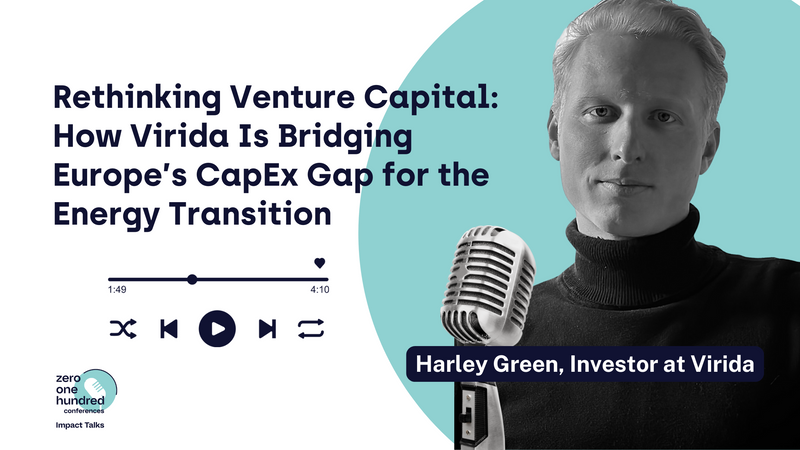
In this episode of 0100 Impact Talks, we speak with Harley Green, investor at Virida — a €100M venture capital fund redefining how Europe finances its energy transition. Harley shares why the traditional VC model doesn't work for capital-intensive climate tech, how Virida is building a new investment playbook, and what it takes to structure and scale hardware-driven startups across Europe. From equity and project finance to impact metrics and LP alignment, this conversation is a must-listen for anyone working at the intersection of climate, capital, and innovation.
So the first question is: What exactly is Virida? What is the investment thesis of this venture capital fund?
Thanks for the intro. Virida is an early-stage VC focused on the energy transition. We're targeting investments from seed to Series A in European companies with a CapEx component. These are not asset-light or typical software startups. Our thesis is built around the idea that climate tech must go beyond software to include the underlying hardware that drives production and consumption in a green economy.
We believe Europe has the talent, regulation, and technology to lead, but lacks the financing structures to scale capital-intensive solutions. We're stepping into the critical gap between technical validation and commercial validation, particularly at the seed and Series A stages, where CapEx-heavy startups struggle to find investors.
Why do you think this new approach to venture capital is a solution for Europe’s financing gap?
There’s a maturing in the venture space. People are realizing that traditional VC equity isn't always the best fit, especially for CapEx-heavy businesses. These startups need equity early, but their path diverges from software companies over time. So we're structured as a venture fund, but with the understanding that our portfolio companies will likely need structured finance, project finance, and debt much earlier.
How exactly does Verida help these companies grow without relying solely on dilutive equity?
There's no one-size-fits-all solution. Once we invest, we work with the company on commercial and financial structuring: contracting, risk management, preparing offtake agreements, and setting them up to access project financing. Our team has deep infrastructure and startup experience, so we know what "bankable" looks like. We help companies get there, step by step, often years in advance of when they'll need to raise debt or scale infrastructure.
How are LPs responding to this approach?
Surprisingly positively. Many LPs recognize this as a real market gap. They're seeing portfolio companies stuck at Series A or B, unable to reach growth funds due to a lack of commercial or financial readiness. Our impact-first approach resonates with them, too. We’re backed by private investors, institutions, and corporates that understand the bottlenecks and are excited about what we’re building.
Doesn’t this require a lot of time and support for each portfolio company?
Absolutely. We're targeting a concentrated portfolio of around 15 companies. We invest with high conviction, provide strategic support, and aim for lower failure rates. Our model doesn’t rely on unicorns. Instead, we target strong multiples across the portfolio—3x to 5x returns—through well-structured exits within the fund’s 10-year life.
Is it fair to say Virida is doing a kind of leveraged buyout for earlier-stage companies?
In some ways, yes—except we're working for our equity. We're providing hands-on help with structuring, strategy, and financing pathways. Many startups won’t need as much help, but for those who do, we bring a rare combination of VC and infrastructure finance expertise.
Tell us more about your geographic focus and first investments.
We’re pan-European, with team members in the UK, Netherlands, and Germany. Most of our deal flow comes from the UK, Benelux, DACH, and Nordics, but we invest wherever the best founders are. We have one portfolio company already and more in the pipeline.
Why did you choose to operate as an Article 8 impact fund instead of Article 9?
We prioritize transparency and flexibility. Article 9 can be burdensome for early-stage companies. We’re fully focused on impact, but don’t believe that being Article 9 is necessary to achieve it. We track impact metrics such as CO2 abatement per euro invested and may evolve our structure over time.
Any final message for investors, founders, or partners?
We’re actively looking to collaborate with anyone working in this space—debt providers, later-stage equity investors, or founders building CapEx-heavy solutions for the energy transition. Our goal is to help build the playbook for financing these types of companies in Europe.

